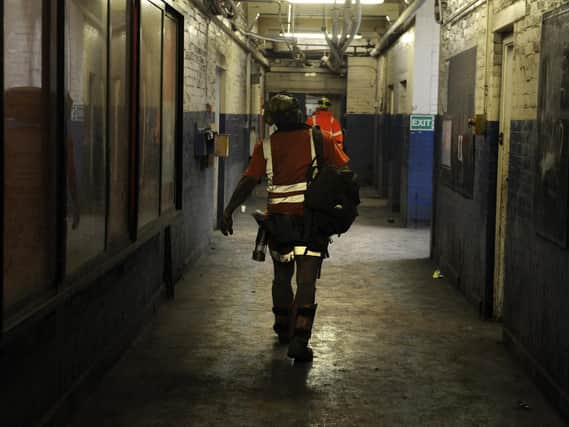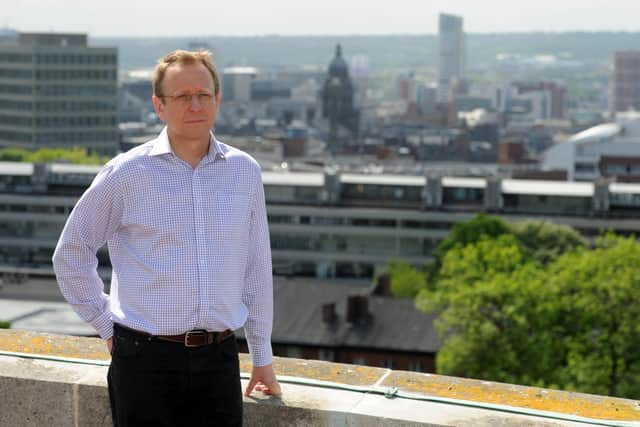'Just' employment transition vital to Yorkshire climate action plan with 300,000 jobs at risk from move to net zero


At its height, the nation’s coal-mining industry employed more than one million people, but by the time the country’s last substantial deep mine in Kellingley closed its doors in 2015, the industry’s remaining handful of tiny mines and opencast coal sites was staffed by fewer than 1,000 workers.
Since the year-long Miners’ Strike to prevent pit closures was fought and lost in the 1980s, energy production may have moved on but the loss of the industry left a deep and lasting scar on many former mining towns and villages in Yorkshire and across the North.
Advertisement
Hide AdAdvertisement
Hide AdA 2019 report commissioned by the Coalfields Regeneration Trust found many places had not recovered from closures more than a generation later, with issues including unemployment, ill health and social disadvantage extending beyond ex-miners to entire communities.


Given this context, it is little surprise that a key focus of the forthcoming Yorkshire Climate Action Plan will be a focus on “just and inclusive” transition to a net zero economy, given an estimated 300,000 current jobs in the region are at some level of risk from pursuing net zero ambitions.
However, the hope of climate leaders is that high-polluting roles in industries such as construction, manufacturing and transport, which are likely to be the most affected by the net-zero transition, will be balanced out by higher demand for projects such as retro-fitting houses in a more environmentally-friendly way.
The burgeoning offshore renewable energy industry in East Yorkshire is also highlighted as an example of how the evolution of jobs can bring new opportunities and economic benefits to Yorkshire.
Advertisement
Hide AdAdvertisement
Hide AdLiz Barber, chairman of Yorkshire and Humber Climate Commission and CEO of Yorkshire Water, said that when it comes to delivering Yorkshire’s climate plans “as important as the what is the how”.
“When you think about how the region has suffered under the changes in manufacturing and coal mining, etc, all the big changes that have happened in the region have not necessarily been beneficial to this region.
“A just and inclusive transition around employment and bringing employment into the region rather than losing jobs in the region is very important.”
Professor Andy Gouldson, Director of Yorkshire and Humber Climate Commission and Professor of Environmental Policy at the University of Leeds, added: “We need to focus on jobs and skills, and there is research which suggests that perhaps 300,000 jobs in the region are at risk from climate change – either climate change impacts or climate change policies. We desperately need to identify and help those sectors and people in those jobs to have a transition plan and to feel like there is something in the future net zero economy for them rather than just a threat to their job and livelihood.
Advertisement
Hide AdAdvertisement
Hide Ad“Related to that, we need to focus on innovation and to accelerate investment.”
He said it is vital to demonstrate to people tangible examples of what the future can hold – citing Northern Gas Network’s recent opening of the UK’s first homes with appliances fuelled entirely by hydrogen in Gateshead.
“On the innovation side, one of the main observations we hear is that people feel they want to feel and touch the kind of services that are being proposed. So at the hydrogen house which Northern Gas Networks have developed and a range of other schemes where people can go and feel the future, literally, in front of them, and therefore hopefully be more comfortable and more willing to engage with it as it moves forward is key.”
Professor Gouldson said there is “a desperate need to develop a climate finance platform which identifies projects and programmes, develops them, makes them more investable and connects them to different forms of finance, and some of the finance can come from within the region through community or civic investment or municipal investment”.
Advertisement
Hide AdAdvertisement
Hide AdHe added: “The opportunity for the region to invest in climate action and then benefit from climate action is really a very tangible one that we need to make the most of.”
Professor Gouldson said an important focus of the forthcoming action plan will be reducing energy demand as a way of cutting carbon emissions – an ambition that presents job opportunities as well as economic challenges.
“In buildings we need a region-wide retrofit scheme for all our different types of housing but also for our public and commercial buildings, and we need to find ways of adopting better standards for new build. This is an area where we need help from national government, because local government sometimes cannot do that on its own.”
He said while research suggesting that 300,000 regional jobs are in question from the net zero transition does look daunting, there are also considerable opportunities for the future.
Advertisement
Hide AdAdvertisement
Hide Ad“There are two pieces of research which has looked at this – one from the place-based Climate Action Network, which suggested that across the region, roughly 10 per cent of jobs would see demand for their skills fall, which equates to 250,000 jobs or something like that. Slightly more people will see demand for their skills increase. So there will be more good green jobs – you only have to look at Hull for examples of what they may look like.
"Then the New Economics Foundation, published a report looking at this area, and they suggested the figure was slightly higher in either high carbon sectors, or areas which might find it hard to adapt to net zero targets.
“One of the key ways that we could respond to that is through developing carbon capture and storage capabilities, which allow some of those sectors to decarbonise using that technology, at least initially. The potential for new job creation, for example through a net zero industrial zone connected to a Carbon Capture Storage facility, is a really exciting one for the region. So there are pros and cons and on balance they look about even.
“But clearly we need to consider the areas at risk and to have an active transition plan to support them to make the transition and make sure that they’re not just left to get on with it on their own.”
Advertisement
Hide AdAdvertisement
Hide AdSupport The Yorkshire Post and become a subscriber today. Your subscription will help us to continue to bring quality news to the people of Yorkshire. In return, you'll see fewer ads on site, get free access to our app and receive exclusive members-only offers. Click here to subscribe.